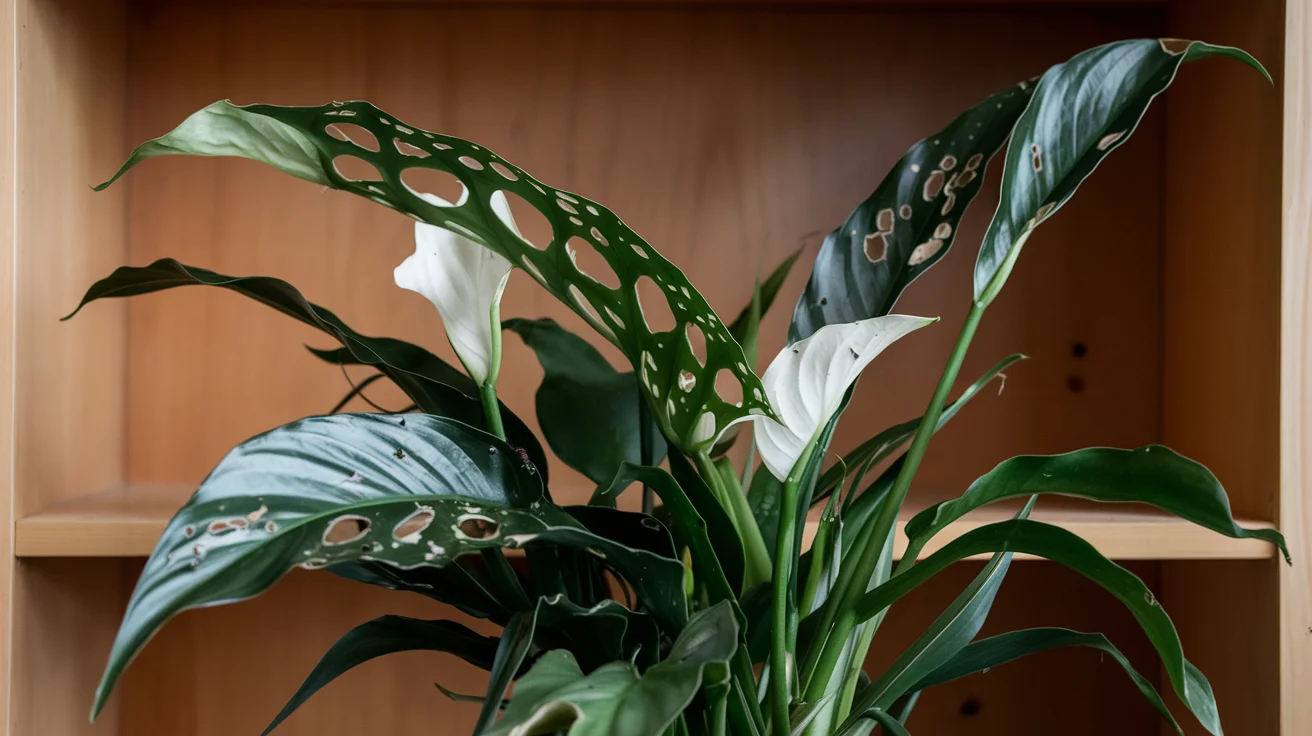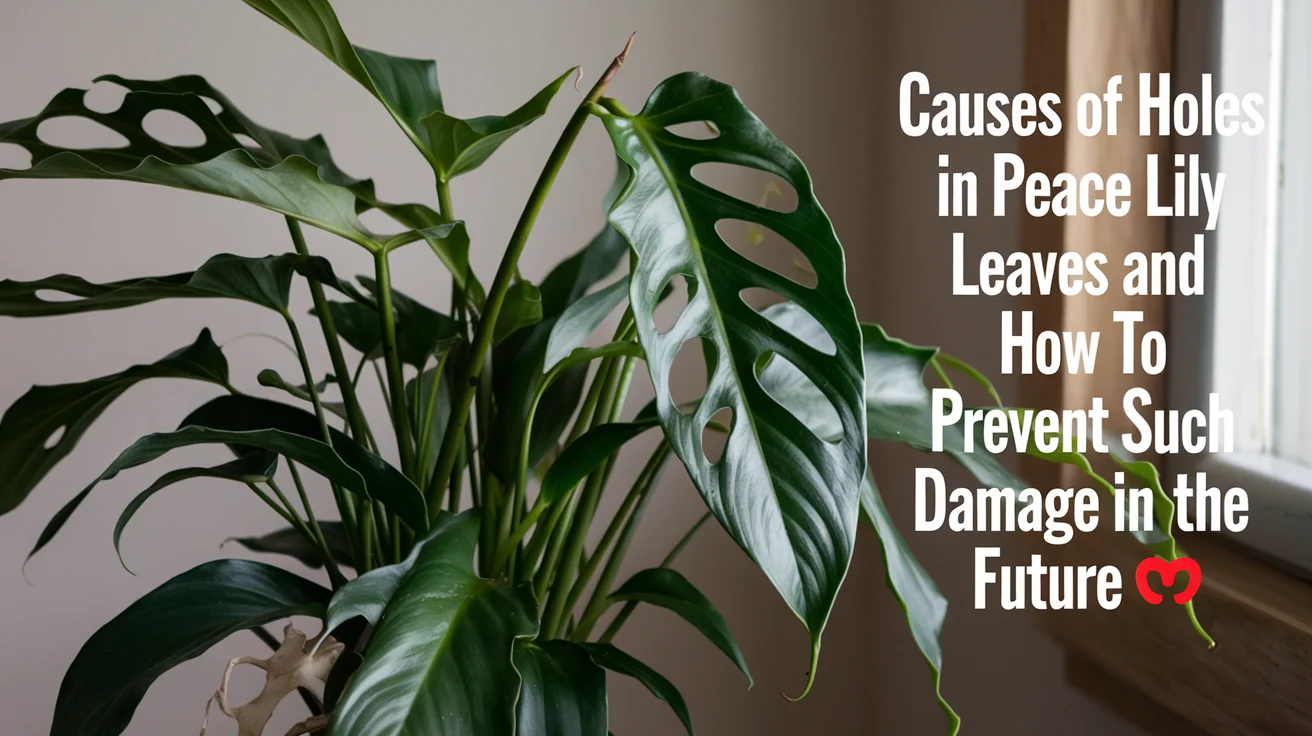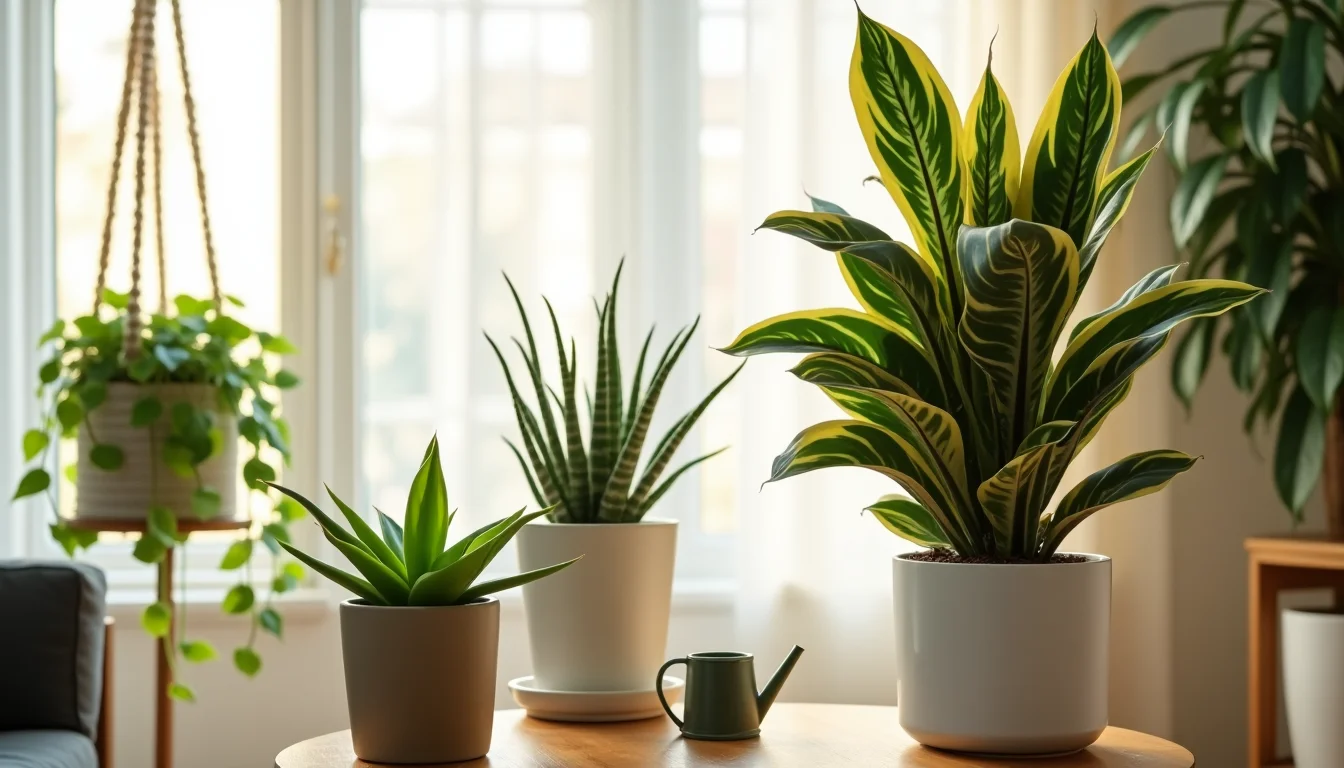People adore the peace lily’s beautiful dark green color and exquisite white flowers. But what happens when those pretty leaves start having those ugly-looking holes? Noticing holes in peace lily leaves can be a cause of concern for plant owners, for it often means that there is something wrong with your plant. There are holes present in the leaves, which could be frustrating to look at and disturbing to mere peace lily growers. This guide will explain why peace lily leaves develop holes. We will share tips to avoid or reduce this problem.
What’s up with the holes in my peace lily leaves? ▴▒☂
There are a variety of reasons why peace lily leaves have holes, including insect bites, environmental factors, and disease. To understand the problems, it is important to get to the bottom of the matter. Below are the most common reasons your peace lily leaves might be developing holes:
Pests 🐛
Pests are the most frequent diagnosis when one notices holes in peace lily leaves. Some of the most common pests that may attack peace lilies are discussed below:
- Spider Mites: This minute pest prefers sucking the leaf sap out of the plant, which leads to the formation of small holes or spots known as ‘leaf etching’ that increases with time.
- Aphids are another typical leaf-destroying insect that uses the vascular plant fluids of their host, leading to compressed and unhealthy leaves, progressively leading to holes.
- Caterpillars or Slugs: Although they are calmer, such widespread pests as caterpillars and slugs are difficult to hide, as they voraciously munch on the green leaves, resulting in ugly, irregular holes in the leaves.
While searching for pests, it may be useful to look under some of the leaves and closer to the base of the plant. Other features may include webbing (spider mites) or sticky honeydew (aphids). In case of the occurrence of pests, treatment should commence and be administered aggressively.
Physical Damage 🖐️
At times, the holes in peace lily leaves can be attributed to factors that cause damage to the plant physically. This could happen when:
- The leaves are shoved or ripped as they are passed around.
- The plant is placed where there is a lot of movement, and pets or people may knock into it.
- The hands or other utensils that are used to erase the dust off or alter the position of the plant harm the leaves inadvertently.
Peace lilies may be hard-wearing plants; however, their foliage may be less tough than it seems. Small cuts can develop into bigger holes if the plant sustains injuries over time.

Improper Watering 💧
It is recommended to be careful with the quantity and timing of the watering, since either excessive watering or too little watering causes stress to the peace lily. Plants are then likely to develop leaf problems, which include yellowing, browning, or holes.
Overwatering: Too much water causes root rot to set in, hence causing great weakness in the plant, especially the leaves.
Underwatering: When the plant lacks enough water, the surfaces of the leaves may become very hard, causing cracks or even holes.
In order to make sure that the leaves remain undamaged, it is crucial that adequate hydration is maintained for the peace lily.
Low Humidity 🌬️
The plant prefers the warm temperature and high humidity level prevalent in its natural habitat, the tropics. Dryness of weather or air in the house can lead to tipping of the leaves’ edges. As the condition worsens, it often leads to small fissures gradually loosening up until they become holes.
If you see holes appearing and the leaf edges becoming brown or curling, in addition to the sudden appearance of holes, there might be a problem with the humidity. Getting a humidity tray carved out or regularly spritzing your plant can fix the situation.
Fungal or Bacterial Infections 🦠
Plant disease is common in peace lilies since they are prone to massive leaf infections. Fungal infections such as leaf spot diseases attack the leaves of plants, resulting in black spots that deepen as the tissues die and can stretch in the end, forming a mouth-like structure. Bacteria can also perforate the other leaf skeleton, hence causing similar damage.
Black spots or brown spots will usually appear along with holes in the leaf, which sometimes become enlarged if the moisture is too high.
Sun Burn ☀️
Although peace lilies do exceptionally well in bright, indirect light, too much direct, hot sunlight can have the opposite effect on the leaves. It is excessive sun exposure that causes sunburn, which manifests itself in brownish patches on leaves that later develop into holes.
So if your peace lily is kept close to the window and is getting a lot of direct sun, then it has to be transferred to a more shaded area or the window has to be shielded by curtains. Since peace lilies do not like direct sunlight, it is best to avoid exposing them to bright or hot locations so as not to burn the leaves.
Now that we have identified the potential reasons for holes appearing in the leaves of peace lily plants, let us in the next section see how best we can fix these problems and avoid future occurrences to ensure the health of your plant.
Look for greenflies on the leaves at regular intervals. 🔍🐞
You must make it a practice to check your peace lily for pests every few weeks. Do not forget to examine the lower part of the leaves and even the soil to find small insects, webs, or something sticky. In the presence of any pests, do the following without delay:
- Wash with insecticidal soap. Formulate a very gentle soap mixture from the plant to combat the pests.
- Remove with a wet wipe. If you are not able to wash the leaves, then you can gently wipe them with a wet cloth.
For protection against insects, seek to apply neem oil when it is necessary.
Handle with Care 🖐️❤️
It is important to be gentle with your peace lily while moving around or cleaning because it might suffer injury unintentionally. If you can, make sure it is placed in a location where it will not get accidentally bumped or pushed.
Water Properly 🚰
Knowing how much water to give and how often is of utmost importance for the well-being of your peace lily. Here, please follow these watering instructions:
- Water the plant only after checking the soil and establishing that the top one inch or two of soil feels dry.
- Use a pot with an adequate number of drainage holes to help in case water remains at the bottom, which may lead to root rot.
- Do not place the pot in water, as even a little soil saturation will lead to leaf issues.
Increase Humidity 🌧️
In case you think the problem is caused by low levels of humidity, you have a couple of choices on how to raise the moisture level in the air Michael has around his peace lily:
Insert a humidifier in the available space near your plant in an effort to ultimately keep it at a rather healthy humidity level.
Use a humidity tray; for example, fill a shallow dish with water and pebbles and put the pot on top of it, so that the pot does not sit in water.
Use a clean mist spray to mist the leaves to increase the humidity around the plant when needed.
Cut off any dying leaves. ✂️
For instance, if your peace lily has large or a few leaves with holes, it is recommended to prune those leaves. Use appropriate tools like scissors to cut the affected leaves off the plant so that they will not be damaged anymore. Pruning helps increase fresh growth and makes the plant more appealing.
Change Your Plant’s Location Due to the Instability of Light 🌤️
Where these holes are caused by sunburn, the peace lily should be moved to an area where it is not exposed directly to the sun. It is best placed in a position that is bright and attracts indirect light. If necessary, use a sheer curtain to diffuse the intensity of light from a neighboring window.
Avoid Fungal Spore Infection. 🦠
To avoid fungal spore infection, proper ventilation in the area where the plant is kept should be ensured, and watering should not be excessive. In case of spotting colors on the leaves, remove such colors from the leaves where the spots have appeared, and use a fungicide where necessary.
Final Thoughts: Ways to Care for Your Peace Lily and its Peace of Mind 🌿❤️
Leaves of the peace lily with holes mean that the plant’s environment is not quite right. The plant may have suffered from pests, lack of water, or environmental stress. Whatever the case may be, you need to take care of the issue fast, and your peace lily will be back to its beautiful self. If you build on this knowledge and use the right techniques, you can prevent these risks. Then, your peace lily will thrive and not suffer further damage.
If you’ve spotted leaves with holes on peace lily plants, do not worry – these hardy plants can be repaired if well cared for. Be on the lookout for and address any problems that arise due to the environment of your plant, and your peace lily will grow back healthy and into a strong plant.





